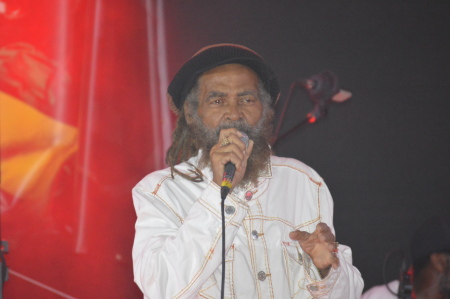
John Holt, minutes before collapsing at the One Love Festival in August
Veteran Jamaican reggae and rock steady singer John Holt has died at the age of 67, weeks after collapsing on stage at this year’s One Love Festival in Milton Keynes.
Kingston-born Holt first came to the attention of Jamaican music lovers following success in nationwide talent contest, Vere Johns Opportunity Hour, and he had recorded a number of local hits, both as a solo artist and duetting with established acts, before, in 1964, he joined vocal harmony group The Paragons, which was then led by Bob Andy.
Holt left The Paragons to pursue a solo career in the late sixties only to subsequently return after Andy’s bandmates decided they needed a stronger lead singer. Andy (later of Bob & Marcia fame), who was also the group’s main songwriter and arranger at the time, decided to leave to accommodate Holt’s return. This late sixties iteration turned out to be The Paragons’ most productive. Holt, backed by Garth ‘Tyrone’ Evans and Howard Barrett, recorded several tracks that have come to be regarded as classics, including ‘Wear You to the Ball’, ‘Memories by the Score’ , ‘On the Beach’ and ‘The Tide is High’. Retaining its original reggae flavour, the latter was later covered by Blondie; becoming an international hit and introducing composer Holt to a much wider audience.
Holt departed The Paragons again in 1970 and went on to become one of reggae music’s most revered solo vocalists. His ‘Stick by Me’ was the best selling reggae record of 1972 and at least one of his ‘Volts of Holt’ series of albums seemingly found a place in the home of every other UK reggae collector.
Holt was not only a talented writer; he was a great interpreter of other artists’ music. ‘Morning of My Life’, a little known Bee Gees track; Stan Getz and Joao Gilberto’s ‘Girl From Ipanema’ and ‘Mr Bojangles’, a jazz standard, were each seamlessly translated into Holt’s signature reggae-lite idiom on his ‘1000 Volts of Holt’ on Trojan Records . The album featured tracks written by Lennon and McCartney and Bacharach and David, as well as songs previously made famous by Shirley Bassey, the Chi-Lites, Bread and the Isley Brothers. ‘Time is the Master’, another outstanding collection, features what is probably my own favourite John Holt track of the period, ‘Again’, which surpassed Etta James’ version and rivalled that of Nat King Cole, in my opinion.
As he had done in his early career, Holt also continued to record duets; notably with Cocoa Tea and the late Dennis Brown. At his peak, he recorded for most of Jamaica’s top producers, including Leslie Kong, Duke Reid, Coxsone Dodd, Henry ‘Junjo’ Lawes and Bunny ‘Striker’ Lee. Considered a balladeer at heart, fans sometimes struggled to accept Holt’s sporadic forays into roots music extolling his Rastafarian faith. A wholesale leap never materialised however – a decision perhaps borne of commercially astute pragmatism rather than any lack of religious commitment.
Holt toured prolifically and had been in demand worldwide for the best part of two decades. His concerts at London’s Royal Albert Hall, Hammersmith Apollo and O2 Arena, often accompanied by the Royal Philharmonic Orchestra and supported by other stellar Jamaican acts, had become legendary.
He was struck ill during his set at August’s One Love Festival at Springfield Park in Milton Keynes. Frankie Campbell, chairman of the Jamaica Association of Vintage Artistes and Affiliates (JAVAA), alluding to the fact Holt had undergone an operation around a month earlier, said at the time: “I just think he went back to performing too early.”
Following his collapse, Holt had again undergone surgery in London from which he was convalescing, according to his manager Copeland Forbes, who confirmed that he died in hospital in the early hours of Monday morning UK time. No official cause of death has been announced at the time of going to print.










